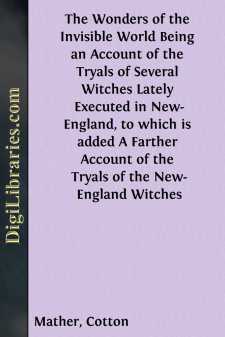Categories
- Antiques & Collectibles 13
- Architecture 36
- Art 48
- Bibles 22
- Biography & Autobiography 813
- Body, Mind & Spirit 142
- Business & Economics 28
- Children's Books 14
- Children's Fiction 11
- Computers 4
- Cooking 94
- Crafts & Hobbies 4
- Drama 346
- Education 46
- Family & Relationships 57
- Fiction 11829
- Games 19
- Gardening 17
- Health & Fitness 34
- History 1377
- House & Home 1
- Humor 147
- Juvenile Fiction 1873
- Juvenile Nonfiction 202
- Language Arts & Disciplines 88
- Law 16
- Literary Collections 686
- Literary Criticism 179
- Mathematics 13
- Medical 41
- Music 40
- Nature 179
- Non-Classifiable 1768
- Performing Arts 7
- Periodicals 1453
- Philosophy 64
- Photography 2
- Poetry 896
- Political Science 203
- Psychology 42
- Reference 154
- Religion 513
- Science 126
- Self-Help 84
- Social Science 81
- Sports & Recreation 34
- Study Aids 3
- Technology & Engineering 59
- Transportation 23
- Travel 463
- True Crime 29
The Wonders of the Invisible World Being an Account of the Tryals of Several Witches Lately Executed in New-England, to which is added A Farther Account of the Tryals of the New-England Witches
by: Cotton Mather
Categories:
Description:
Excerpt
INTRODUCTION.
The two very rare works reprinted in the present volume, written by two of the most celebrated of the early American divines, relate to one of the most extraordinary cases of popular delusion that modern times have witnessed. It was a delusion, moreover, to which men of learning and piety lent themselves, and thus became the means of increasing it. The scene of this affair was the puritanical colony of New England, since better known as Massachusetts, the colonists of which appear to have carried with them, in an exaggerated form, the superstitious feelings with regard to witchcraft which then prevailed in the mother country. In the spring of 1692 an alarm of witchcraft was raised in the family of the minister of Salem, and some black servants were charged with the supposed crime. Once started, the alarm spread rapidly, and in a very short time a great number of people fell under suspicion, and many were thrown into prison on very frivolous grounds, supported, as such charges usually were, by very unworthy witnesses. The new governor of the colony, Sir William Phipps, arrived from England in the middle of May, and he seems to have been carried away by the excitement, and authorized judicial prosecutions. The trials began at the commencement of June; and the first victim, a woman named Bridget Bishop, was hanged. Governor Phipps, embarrassed by this extraordinary state of things, called in the assistance of the clergy of Boston.
There was at this time in Boston a distinguished family of puritanical ministers of the name of Mather. Richard Mather, an English non-conformist divine, had emigrated to America in 1636, and settled at Dorchester, where, in 1639, he had a son born, who was named, in accordance with the peculiar nomenclature of the puritans, Increase Mather. This son distinguished himself much by his acquirements as a scholar and a theologian, became established as a minister in Boston, and in 1685 was elected president of Harvard College. His son, born at Boston in 1663, and called from the name of his mother's family, Cotton Mather, became more remarkable than his father for his scholarship, gained also a distinguished position in Harvard College, and was also, at the time of which we are speaking, a minister of the gospel in Boston. Cotton Mather had adopted all the most extreme notions of the puritanical party with regard to witchcraft, and he had recently had an opportunity of displaying them. In the summer of the year 1688, the children of a mason of Boston named John Goodwin were suddenly seized with fits and strange afflictions, which were at once ascribed to witchcraft, and an Irish washerwoman named Glover, employed by the family, was suspected of being the witch. Cotton Mather was called in to witness the sufferings of Goodwin's children; and he took home with him one of them, a little girl, who had first displayed these symptoms, in order to examine her with more care. The result was, that the Irish woman was brought to a trial, found guilty, and hanged; and Cotton Mather published next year an account of the case, under the title of "Late Memorable Providences, relating to Witchcraft and Possession," which displays a very extraordinary amount of credulity, and an equally great want of anything like sound judgment....


